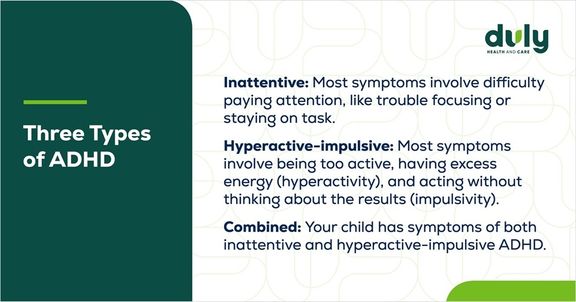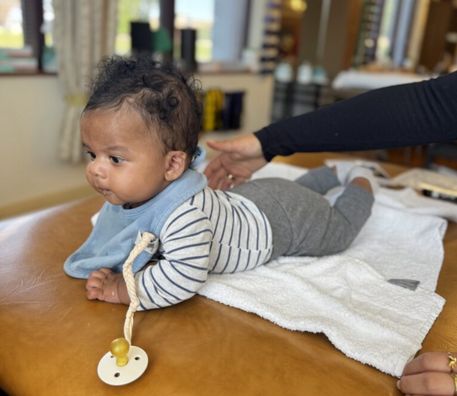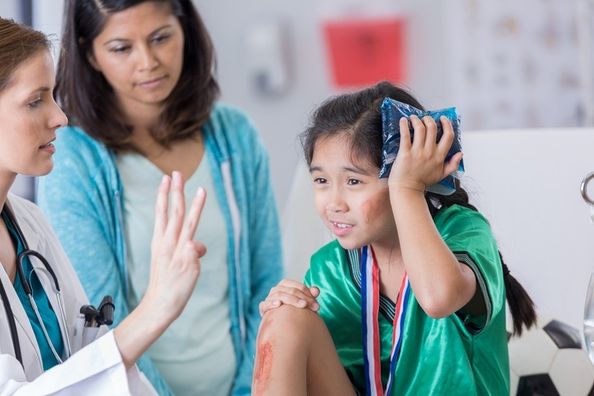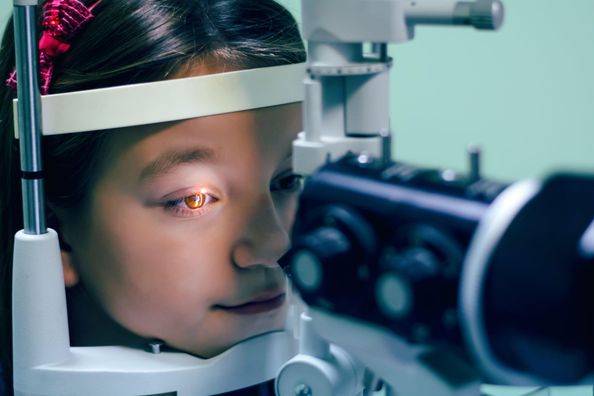Being able to tell the difference between ADHD and typical childhood behavior can be challenging for parents and caregivers. Duly providers can help educate parents about ADHD and guide them through testing to understand how their child’s brain learns and functions.
We often recommend evaluation when we see one or more of these signs:
- Your child keeps getting in trouble at school for having too much energy, disturbing others, blurting out answers, being the class clown or other signs of high energy.
- Your child is being impulsive (e.g., reacting without thinking) with their actions and getting in trouble at school or home.
- Your child is said to be daydreaming, “getting bored” in class, doodling during class, having a hard time focusing on getting tasks done, having a hard time listening and following directions, having to work harder than peers to learn and make good grades, or not having good grades, although they are smart and hardworking.
What is ADHD?
The inability to pay attention, the impulsive choices, the hyperactive behavior – these are some of the hallmark symptoms of attention deficit hyperactivity disorder (ADHD).
ADHD is a condition where the brain works in a unique way that, when properly supported, can become a tremendous asset for both the child and their community. ADHD can be diagnosed at any age, as symptoms usually begin in early childhood (e.g. kindergarten age).
Many symptoms of ADHD in children happen in a school or recreational setting, so you might not notice them right away. If a teacher, day care provider, or coach reports that your child is having one or more of the challenges listed above, it could be a clue that your child has ADHD.
Whether you’re constantly asking, “Does my child have ADHD?” or they’ve already been diagnosed, it’s important to understand the basics of ADHD and how to help them.
There Is More Than One Type of ADHD.
There are three types of ADHD, and the type your child may have depends on their symptoms.

Combined ADHD is the most common type and is what people often picture when they think about ADHD.
Some of the main symptoms of ADHD include:
Inattentive Symptoms:
- Difficulty paying attention and being easily distracted during school or play
- Frequent daydreaming
- Making careless mistakes on schoolwork and not caring about details
- Being disorganized, like with toys or school supplies
- Constantly losing or forgetting things
- Forgetting to do tasks, like chores
- Avoiding doing things that require focusing for a long period of time, like homework
- Seeming distracted when someone is talking to them
Hyperactive-Impulsive Symptoms:
- Seeming like they’re always on the go or driven by a motor
- Squirming and fidgeting
- Inability to stay seated
- Difficulty waiting their turn
- Being extremely talkative (more than you would expect)
- Frequently climbing, jumping, or running when it’s against the rules
- Having trouble playing quietly
- Blurting out answers or speaking out of turn
- Interrupting people’s conversations, activities, or games
- Acting and speaking without thinking
Not All Children With ADHD Symptoms Have ADHD
If your child has these symptoms every once in a while, that doesn’t mean they have ADHD. It’s normal for children to have short attention spans, be full of energy, or sometimes avoid doing their homework. That’s why ADHD is only diagnosed when a child has had symptoms for at least six months, has symptoms in more than one setting (like both at home and at school), and their symptoms get in the way of daily life.
In addition, your child’s provider will need to rule out other possible causes of these symptoms, like sleep disorders (not getting the adequate amount of sleep for your child’s age, and/or not having good quality of sleep e.g. restless, waking up, sleep talking, sleep walking, snoring etc.), nutritional deficiencies (e.g. vitamin or iron deficiencies), learning disorders, anxiety, depression, or difficulty seeing or hearing.
A Word From Our Doctor
“I do not view ADHD as a “disorder”, but a unique gift that allows for a lot of the inventions and creations that are enjoyed by the human race (e.g. Einstein, Edison, writers, artists, etc.)”
- Pratip Nag, MD, PhD, Pediatrician with Duly Health and Care
Your child’s unique mind is their greatest gift. If you’re seeing signs of ADHD, our Duly pediatricians can help you understand and nurture their unique potential, with same-day primary care appointments available when you need them.
Find Primary Care near you >
There Are Many Ways to Treat ADHD
First, it is important for us to understand why we need to help children who have ADHD. To understand the need for a thoughtful and caring treatment plan for children with ADHD, it is important for us to appreciate that ADHD is a gift that is prevalent in around 11% of children in the US. Justifiably, the majority of educational institutions (e.g., schools, colleges, etc.) and the ways we educate children are developed to accommodate the children and adolescents who do not have ADHD.
It can be very stressful for a child who has the gift of ADHD to function in an environment that is not geared to the way they learn best. Having ADHD can be socially stressful (e.g. peer relations, family relations) for the child. They need thoughtful support to harness their unique strengths, reach their full potential, and thrive in environments that celebrate their creativity.
A thoughtful and comprehensive plan for children who have ADHD includes the following:
- Counseling for parents (and the child) to help them successfully accomplish all their daily tasks at home and school.
- This helps the child feel good about achieving what they expect from themselves and what others (e.g. parents, teachers) expect from them.
- Parents (and the child) must work with the school/college to set up a 504 plan or Individualized Educational Plan (IEP) that provides the accommodations that the child needs to succeed in school and activities.
- The 504/IEP plan needs to be reassessed every year and adapted to the child’s needs.
- Medical evaluation and interventions:
- Thorough evaluation of sleep quantity and quality, which may require assessment of iron stores, e.g., Ferritin, Vitamin D, snoring, allergies, or a sleep study.
- Evaluation for anemia, iron deficiency, vitamin deficiencies, thyroid disorders, and other medical conditions.
- Evaluation and optimization of diet, gut health, constipation, etc.
- Medication management for ADHD.
- Evaluation and management of co-occurring mental health conditions, e.g., anxiety, depression, bipolar disorder, etc.
It’s normal to be hesitant to start your child on medication, especially if they’re young. Medications are the most effective way to help children who have ADHD. Medications have been shown to help around 80% of children with ADHD have fewer symptoms.
Multiple studies have shown that children who had the benefit of medications for their ADHD achieved a higher quality of life, higher socio-economic status, and had much lower rates of substance use disorder compared to children who were not provided the help of a medication during their school years.
Make Sure Your Child Is Getting the Right Support at School.
Working directly with your child’s school is a great way to set them up for success. For example:
- Talk to their teachers about your concerns and develop solutions together. Let them know how ADHD has affected your child at school in the past and what tends to work or not work for them.
- Learn about accommodations. ADHD is considered a developmental disability, which means your child has legal rights to an individualized education program (IEP) or a 504 plan for educational support.
- Put together a team. When you have meetings at the school with the teacher and special educator, you can request that your child’s physician, the school psychologist, the nurse, or the guidance counselor provide input.
Also read: The Back-to-School Checklist
And at Home.
There are also things you can do at home to support your child (and make life a bit easier for yourself, too). Some ways to do this include:
- Keeping a regular schedule, since children with ADHD often have trouble adjusting to change.
- Helping your child stay organized (like with toys or school supplies).
- Create a daily visual checklist that lets them earn time for favorite activities (e.g., electronics).
- Complimenting them when they make good choices, rather than just focusing on behavior that doesn’t align with others’ expectations.
- Learning the style of discipline that works best for your child’s unique needs.
- Practice giving the child options for common things that are day-to-day. These are choices that the parent is okay with (e.g. do you want to eat x or y, wear a, or b, go to the park or the pool etc.).
- Encouraging them to do activities that they’re interested in (such as sports or clubs) to build self-esteem.
- Demonstrating and using simple words when giving instructions with good eye contact. Practice, asking them to tell you what they understood of your instruction.
- Having them eat a healthy diet, be active every day, and get enough sleep, since these habits will help them manage symptoms
The Earlier You Can Help Your Child, the Better.
Don’t hesitate to seek answers if you suspect ADHD or if your child needs treatment. Early diagnosis and treatment are key for helping your child succeed, rein in problematic or impulsive behavior (so they are not developing a negative self-image), and be successful in school, social situations, and achieve their fullest potential of their creative minds.
Also, your child may have additional health or developmental concerns. It’s not unusual for children with ADHD to also have conditions such as anxiety disorders, autism, obsessive-compulsive disorder (OCD), or mental health disorders like depression or bipolar disorder. These conditions are also important to diagnose and treat early on.
Reach out to your child’s pediatrician to get started.
Also read: 4 Tips On How to Talk to Your Child About Building Healthy Habits
You Are Not to Blame.
The exact cause of ADHD isn’t clear, but we know it’s not due to parenting decisions. It can run in families, but that’s often due to genes (which can’t be controlled). You should never feel guilty or blame yourself for your child having ADHD.
Your child’s unique mind deserves support that helps them thrive. Whether you suspect ADHD or need help with an existing diagnosis, schedule with a Duly pediatrician today.
Find a Pediatrician near you >
Health Topics:








